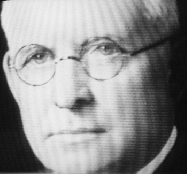
The stated goal of William Callahan, the Alabama trial judge for the later Scottsboro trials (those from November, 1933 to July, 1937) was to "debunk" the Scottsboro case-- to cut it down to size, to take it off the front pages of America's newspapers. To this end, Callahan imposed strict time limits on the trials, persuaded the Governor not to provide National Guard protection for the defense team, and made it as difficult as possible for reporters to cover the trial.
An equally obvious, though unstated, goal of the seventy-year-old judge was to help secure the prompt convictions of the Scottsboro defendants. Haywood Patterson said of Callahan, "He couldn't get us to the chair fast enough." Callahan denied almost every motion of the defense, including a motion to quash the indictments because Negroes were excluded from jury rolls and a motion for a change of venue. He sustained nearly every prosecution objection to a defense question of a witness, and often objected himself when the prosecution didn't. He cut off any inquiry into the reputation of Victoria Price, and even refused to let the defense explain that the semen found in Price might have been caused by sexual relations she had with Jack Tiller less than two days before the alleged rape. He refused to delay a trial for one day to allow a defense medical expert to testify. Callahan's instructions to the jury were "a point-by-point refutation of the defense's case." He told the jury it should very strongly presume that no white woman would voluntarily have sex with a black. After finishing his instructions to the jury in the third Patterson trial, Callahan neglected to give the jury a form for acquittal until the prosecution, fearing reversible error, asked him to do so.
Defense attorney Samuel Leibowitz found Callahna ignorant of the law, arrogant, intolerant, and prejudiced against the defense. For his part, Callahan thought Leibowitz disrespectful. Callahan interrupted the Norris trial to reprimand Leibowitz, and on another occasion with the jury present, called a Liebowitz question "viscious." Often during trials Callahan either mocked, baited, scolded, or frowned at Leibowitz and other defense attorneys.
Callahan was born on a farm in Lawrence County, Alabama on the eve of the battle of Gettysburg. He attended neither college nor law school, but instead learned what law he did working in a Decatur law office. Callahan served as the solicitor of Decatur and as a member of the Alabama legislature before being elected circuit judge in 1928.
